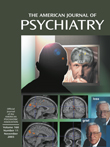Early Prediction of Antipsychotic Response in Schizophrenia
Abstract
OBJECTIVE: The authors’ goal was to examine the predictive value of early symptom changes indicating response to antipsychotic medication in schizophrenia. METHOD: One hundred thirty-one acutely ill patients with schizophrenia received 4 weeks of fluphenazine treatment. Brief Psychiatric Rating Scale (BPRS) ratings were obtained at baseline and weekly. The authors examined the relationship between changes in BPRS total score and each factor score following 1 week of treatment and ultimate response status, defined as a reduction of 20% or more in total BPRS score. RESULTS: Every patient who displayed an improvement of less than 20% in BPRS total score and 95% of patients who displayed a reduction of less than 20% in BPRS thought disturbance factor score following 1 week of treatment were classified as nonresponders after 4 weeks of treatment. CONCLUSIONS: These data suggest that patients with minimal improvement in positive symptoms during the first week of treatment with a typical antipsychotic are unlikely to respond to a 4-week trial. These data require confirmation and extension to studies with second-generation antipsychotics.



